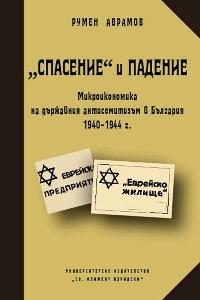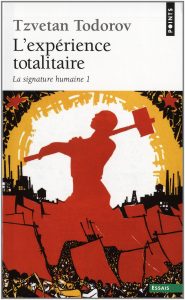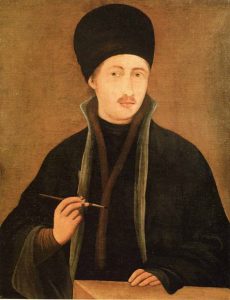The events about which I am talking here took place more than 70 years ago and are extremely well documented. But until today there are two competing narratives regarding the interpretation of these events and a recent interview of the former Bulgarian Czar and later Prime Minister Simeon Sakskoburggotski (Simeon von Sachsen-Coburg-Gotha) brought them to the surface again and created a quite heated discussion in the public sphere in Bulgaria.
The facts: Bulgaria, whose government at that time had since long very close ties to Nazi Germany, joined the Axis officially on March 1, 1941. Bulgaria had lost territories in the Balkan Wars and WWI that it considered to be rightfully part of Bulgaria, and Nazi Germany supported these territorial claims to Macedonia, a part of Kosovo, the Dobrudzha, and the Greek part of Thrace. Part of the deal to join the Axis was on the other hand to actively support the extermination of the Jews – it was later agreed that Bulgaria will “deliver” as a starter 20,000 Jews to the Nazis. So, in the end of the day it was a deal “territory against handing out the Jews for extermination”.
Even before joining the Axis, the Bulgarian government started to support actively the anti-Semitic policy of the Nazis. Bulgaria issued laws that deprived Bulgarian Jews of most of their rights; the laws were inspired by the anti-Semitic laws in Nazi Germany that in a way prepared the population to accept the fact the Jews were no citizens, and actually not even human beings in the ideology of the Nazis and their willing helpers.
In spring 1943, the Bulgarian parliament issued a supportive vote to deport for now 20,000 Jews from the territory of Bulgaria (including those territories that were to be annexed by Bulgaria) to Poland. 11,363 Jews from Bulgarian-occupied Macedonia and Western Thrace were rounded up by Bulgarian police and military, put in trains guarded by Bulgarians and sent mainly to Treblinka. There was literally only a handful of survivors.
When in March 1943 the Bulgarian authorities started to announce their intention to round up also the Jews from the “Old” Bulgarian territory, i.e. Bulgaria in the borders before 1941, courageous Bulgarian citizens, a few politicians with a conscious (such as Dimitar Peshev), and some of the leaders of the Bulgarian Orthodox Church (Metropolit Kiril and Metropolit Stefan), organized public resistance in Kyustendil, Sofia, Plovdiv, and other places. A demonstration of the illegal Communist party in Sofia resulted in the arrest of more than 400 participants.
Bulgaria was a country where antisemitism was not a mass phenomenon, most Bulgarians traditionally held good relationships with their Jewish neighbors and felt that they were Bulgarian citizens just like everybody else. It became obvious to the government and to the powerful Czar Boris III that they had underestimated the supportive reaction of the Bulgarian population for the Jews; at a time when it was already clear that Nazi Germany will lose the war (this happened after the capitulation of Stalingrad), the Czar and the government decided to “play on time”.
In order to avoid a serious crisis and threat to their power by a possibly very strong reaction of a considerable part of the Bulgarian population if they would deport the remaining Jews to Poland, they found all kind of excuses to delay the deportation – much to the anger of Dannecker, the highest Nazi representative in Bulgaria who was dealing with the organisation of the endlösung, and of Hitler personally. But knowing fully well that he was on the losing side, Boris (who died a few days after he visited Hitler in Germany) tried to gain some leverage for the time after the war. And to be considered the “savior” of the Bulgarian Jews would be possibly part of that leverage, so he hoped.
As a result, all Jews within the pre-1941 territory of Bulgaria survived (unless they perished as part of the partisan movement); almost all Jews in the annexed territories were killed.
In his recent interview with CNN, the son of Czar Boris III, the former Czar Simeon II, and later Prime Minister of Bulgaria, mentioned his hopes that his father will be declared one of the Righteous Among the Nations, a title awarded by Yad Vashem to non-Jews who risked their lives to save Jews during the Holocaust.
The basic criteria to be awarded the title of Righteous Among the Nations, according to the official website of the Yad Vashem Memorial are as follows:
- Active involvement of the rescuer in saving one or several Jews from the threat of death or deportation to death camps;
- Risk to the rescuer’s life, liberty or position;
- The initial motivation being the intention to help persecuted Jews: i.e. not for payment or any other reward such as religious conversion of the saved person, adoption of a child, etc.;
- The existence of testimony of those who were helped or at least unequivocal documentation establishing the nature of the rescue and its circumstances.
It is obvious that Czar Boris III is not fulfilling a single one of these criteria.
I would not have mentioned the attempt of a son to whitewash his father from his responsibility of the death of more than 11,000 people, if it would be a private matter only. But Simeon is not a private person only. He came back to Bulgaria after decades of exile to become Prime Minister, making the promise that after 800 days the Bulgarians would live better under his rule (he and his sister live indeed much better now – one of the first laws he issued was about the restitution of the private property of the family of the Czar, and now he and his sister own land and properties that were never theirs, and which make them the by far biggest landowners in Bulgaria).
The reason why I am writing about this topic is another one. What we can witness in Bulgaria is the attempt of interested circles to whitewash history, to deny historical responsibility for the deeds of the past, or even for serious crimes that were committed in the past. That is not limited to Bulgaria of course, and it is not limited to the role of the Czar in the survival of the Bulgarian Jews living on the pre-1941 Bulgarian territory. Revisionism is in my opinion a very serious threat for Bulgaria. Only when you know who you are and what you did in the past and for what you are responsible, you have a chance to learn from history.
An article written by Manol Glishev, a poet and intellectual, shows clearly the very ugly side of this kind of revisionism. I was really shocked and aghast when I read it.
After an introduction which he is using to insult everyone who dares to be critical regarding Boris’ role and Simeon’s objective lies about that part of history (see below), saying that “negativism transferred from father to son or from son to father is a totalitarian practice”(!!!), we “learn” in his article how Boris III was working hard for years to preserve the life of every Bulgarian – but “unfortunately” the Jews in the occupied and annexed territories were not Bulgarians, so there was nothing he could do. (This is ignoring the fact that it was Boris III and his government that “made” all inhabitants of the occupied and annexed territories into Bulgarians – except for the Jews, for which he had already other plans.)
In one of the paragraphs that is dealing with the fate of the Macedonian and Thracian Jews, Glishev is writing that Macedonia was not part of Bulgaria at the time of the deportation and that the Czar made “big efforts” to save the Macedonian and Thracian Jews. Both is simply a fabrication. I would recommend Mr Glishev to read a bit about the historical facts. As a start I could recommend him the excellent book by Rumen Avramov: “Salvation” and fall: Microeconomics of the state antisemitism in Bulgaria 1940-1944, which shows among other things the very strong involvement of the Bulgarian state, its government and its ruler, Czar Boris III in the deportation and killing of the Jews in the annexed territories. That the Bulgarian state and Boris himself bear the responsibility for the extermination of the Jews in Macedonia and Western Thrace is also evident from the documents published recently by Avramov and Nadia Danova from the archives of Alexander Belev, the “Kommissar für Judenfragen” in Bulgaria, the organizer of the activities against the Jews. Mr Glishev could also inform himself by reading the Dimitar Peshev biography by Gabriele Nissim. Or Arno Lustiger’s excellent book Rettungswiderstand, in which the author describes clearly and with plenty of documentary support that the main responsibility for the extermination of the Jews in Macedonia and Western Thrace was with the Bulgarian government and Boris III.
When Mr Glishev even writes that “Boris is more than a Bulgarian Schindler” (headline of his article), I feel really that I am running out of words. To read a headline like this from an intellectual and poet is sickening. His intervention on behalf of an opportunistic ruler who sided with the Nazis because it suited his policy to increase the Bulgarian territory (and let – if possible – others do the dirty job for him), someone who didn’t have the slightest problem to turn the Bulgarian Jews into slaves that were deprived of almost any human rights, someone who ordered his policemen and military to round up the Jews in Macedonia and Western Thrace and send them to Treblinka, is not a worthy cause by any means.
According to the logic applied by Mr Glishev, Joseph Goebbels should be given the title of a Righteous Among the Nations too. It was Goebbels, who ordered the release of about 2,000 Jews in Berlin in 1943, after a group of women demonstrated in the Rosenstrasse in Berlin, after the arrest of their Jewish husbands and fathers. As a result of these unexpected demonstrations, and after a major bombing raid, Goebbels decided not to fuel possible protests and to release these people – for the time being. Does that make Goebbels a “savior of the Jews of Berlin”? The answer is obvious, and I feel ashamed that some people, among them even intellectuals and writers have the chutzpah to make a “savior of the Jews” out of an opportunist and bootlicker of the Nazis, who partnered in their crimes whenever it was favorable for him.
In an emotional, but factually correct response, the writer and survivor Lea Cohen answered to Glishev’s unsupportable article and Simeon’s interview.
Contrary to what Simeon said in the interview, Bulgaria was not an occupied country; Macedonia and Western Thrace were occupied by Bulgarian troops; to say that Boris “was hiding the Jews in labor camps” is so ridiculous and outrageous as to say Stalin was “hiding the opposition in labor camps”; it was not Simeon’s mother, but the Spanish ambassador that issued passports to the Bulgarian Jews; it was not the Nazi administration, but the Bulgarian administration that sent the Jews from Macedonia and Western Thrace to Treblinka; Boris III name was removed by the Jewish National Fund from all commemorative signs after a committee headed by an Israeli High Court judge came to the result that he in no way was responsible for saving the Bulgarian Jews – Simeon is just outright lying in this interview.
It makes me angry to see a person spreading so much obvious revisionist lies as Simeon does; it is sickening to see some intellectual and writer running to his help for his outrageous lies, trying to manipulate the public opinion in Bulgaria in accordance with Simeon’s revisionist agenda.
That the Jews in the pre-1941 Bulgarian territory were saved, is and will always be an honorable act by the part of the Bulgarian population responsible for it and by those people who voiced their resistance to the planned deportation; Boris III doesn’t belong to that group of honorable people, and revisionist campaigns like the one his son, with the support of interested circles, is running now, will hopefully have no success. This is not only a question of the interpretation of historical events; it is also a question of morals and ethics.
It is high time to admit that also Bulgaria had its share of responsibility in the Holocaust, and that the saving of a part of the Jews is just a (convenient) part of the whole story. It is also important to remember who was responsible from the Bulgarian side for this participation in the Holocaust: the Bulgarian government at that time, and the monarch Czar Boris III. That may be painful for some people who still prefer a made-up version of history to the truth – but it is indispensable for the country’s future. Only a Bulgaria that acknowledges its past – and not a revisionist parody of it – will be able to build a future free of the ghosts of antisemitism, racism and fascism.

Румен Аврамов: „Спасение“ и падение, Университетско издателство „Св.
Климент Охридски“, 2012 (Rumen Avramov: “Salvation” and fall: Microeconomics of the state antisemitism in Bulgaria, 1940-1944), Sofia 2012
Румен Аврамов и Надя Данова: Депортирането на евреите от Вардарска Македония, Беломорска Тракия и Пирот, март 1943 г./ Т. I-II (Rumen Avramov and Nadya Danova, eds.: The deportation of the Jews from Vardar Macedonia, Aegean Thrakia and Pirot, March 1943, 2 vol.), Sofia 2013
Arno Lustiger: Rettungswiderstand. Über die Judenretter in Europa während der NS-Zeit. Wallstein, Göttingen 2011
Gabriele Nissim: The Man who stopped Hitler, I. Borouchoff, 2002
© Thomas Hübner and mytwostotinki.com, 2014-5. Unauthorized use and/or duplication of this material without expressed and written permission from this blog’s author and/or owner is strictly prohibited. Excerpts and links may be used, provided that full and clear credit is given to Thomas Hübner and mytwostotinki.com with appropriate and specific direction to the original content.






 Facebook
Facebook RSS
RSS Twitter
Twitter